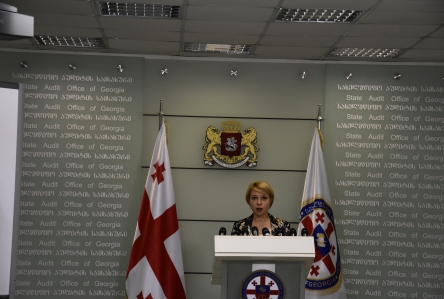On June 1st, 2017 the first Deputy Auditor General, Nino Lomjaria, presented to the media the 2016 annual report of the State Audit Office of Georgia (SAOG).
Throughout 2016 SAOG conducted audits, which covered high risk areas, with strong public interest at both central and municipal levels. The audited spheres encompassed healthcare, education, defense, infrastructure, environment, economy, etc. In total 71 audits were carried out, through which 10.3bn Gel of the total budget was examined. Financial costs of the revealed inefficiencies amounted to 71m Gel, including deficiencies related to:
- Public procurement management – 32.8m Gel;
- Budgetary resource management – 33.4 m Gel;
- Asset management – 5m Gel.
For the improvement of the mentioned weaknesses SAOG issued 189 recommendations, out of which 47% was implemented. However, the implementation rate of high priority recommendations is only 22%. Compared to previous years (40% implementation rate in 2015) there is an obvious increase in the number of implemented recommendations by the auditees; however, the current implementation rate is still low and requires additional effort. It is important to emphasize that the major impact of the audit work is not solely measured by the issued recommendations, but also, by their implementation rates.
In 2016, 27 audit reports, with relevant materials, were sent to the law-enforcement agencies.
Some of the main accomplishments of SAOG in 2016 were as follows:
- SAOG fulfilled all its obligations defined in the Association Agenda between Georgia and the European Union;
- SAOG fully complied with the conditions set by the European Union within the framework of Public Finance Policy Reforms (PFPR); as a result, the third tranche with the amount of 1.5m Euros was released and directed towards the State Budget of Georgia.
- The Financial Monitoring Service of Political Parties during the recent parliamentary elections received considerable acclamation both locally and internationally;
- SAOG developed an innovative web-platform – “Budget Monitor”, which enables Members of Parliament, experts, civil society and other interested parties, to access information about public resource management via easy-to-understand visualizations and infographics;
- SAOG maintained active communication with the International Organization of Supreme Audit Institutions (INTOSAI) and its subgroups (EUROSAI, ASOSAI).
- For further development of IT audit at SAOG, the organization started to collaborate with the Center of Excellence of the Government Accountability Office (GAO) of the United States. Last year, a separate unit for IT audit was created;
- For capacity building purposes more than 150 SAOG’s staff members participated in wide range of trainings related to auditing. Moreover, around 34 students completed internship programs at the organization.
- In 2016 the cooperation between SAOG and the Georgian Parliament was substantially enhanced; nevertheless, strengthening the role of Parliament in the monitoring process of recommendation implementation remains to be one of the biggest challenges.
Please see the full report














